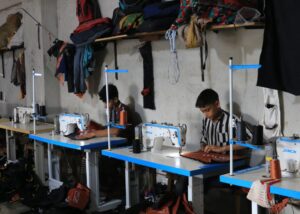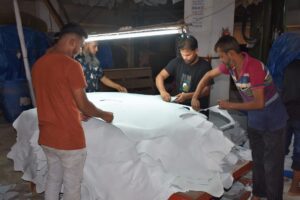Promotion of Decent Work for Agricultural Workers in Bangladesh
Agriculture is the single most important sector of the Bangladesh economy providing the major source of livelihood in the rural areas where about 78 percent of the population lives. The sector accounts for 47 percent of the total labour force and contributes approximately 16 percent of the GDP. The performance of this sector has an overwhelming impact on major macroeconomic objectives like employment generation, poverty alleviation, human resources development, and food security. Participation of women workers in the agriculture sector of Bangladesh is increasing with visible discrimination at workplaces.
The agriculture sector in Bangladesh is presently suffering from an acute decent work deficit. The basic characteristics of the informal sector of Bangladesh are no policy and legal framework; absence of employer-employee relationship; poor wage; long working hours; high occupational health and safety risks; no social protection/safety-net and lack of fundamental rights of the workers at workplaces, low organising capacity, and initiatives by trade unions, etc.
According to Bangladesh Labour Force Survey 2013, the total labour forces are 5.41 cores where 3.79 male & 1.62 are female. Total 47.3% are employed in the agriculture sector where employed in industry sector 17.64% & service sector 35.06%.
The socio-economic condition of agricultural labour in Bangladesh is not up to the mark. They lead their lives & livelihood through selling labour, cultivating land on a shared basis/ lease. Very often they do not receive fair wages and a fair share of produced crops. Even they do not receive a fair price of crops also. No social security scheme for them. As per the agriculture census, in 1996 approximately 65% of families are included the definition of rural wage. They are the majority class of Bangladesh. Officially they are defined as rural poor. Agricultural labours are amongst the poorest people in rural areas. Their jobs are often temporary, wages are low and working conditions can be very hazardous. More and more women are in waged agricultural jobs, but despite their numbers, they are generally “invisible” to governments, donors, and international institutions.
Existing labour law of the country recently permitted the agriculture worker rights to form trade unions and bargain collectively in a limited way although the country has ratified ILO Convention 87 & 98 long ago. So far very few initiatives are taken at the national level towards organising the workers in this sector or engaged in a dedicated policy advocacy campaign at the national level on the promotion of rights and social protection of agriculture workers through the collective initiative of Labour NGOs and National trade unions. There is always a need for an integrated organising initiative and policy advocacy actions for having special policy measures and legal framework of protecting workplace rights and minimum social protection measures for workers at agriculture sector of Bangladesh, and building capacity of trade unions integrating the agriculture workers under the umbrella of the union.
This project instigates to build the capacity of the workers who those are working in the agriculture in both project areas towards organising as well as raising awareness on occupational health and safety to prevent occupational hazards and diseases. Through the project activities, BLF also contributed to the improvement of the working conditions, reduce gender discrimination, and build awareness and capacity regarding trade unionism, FOA in the agricultural industry in Bangladesh.
Related posts

Improving The Capacity of The Workers to Ensure Decent Work In The RMG for Local Market In Bangladesh
Read More »


